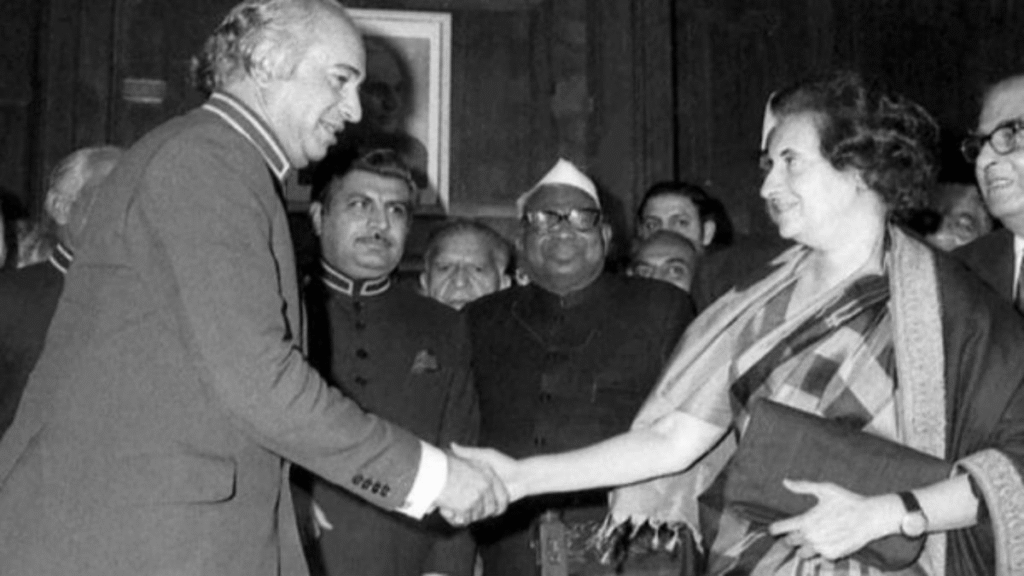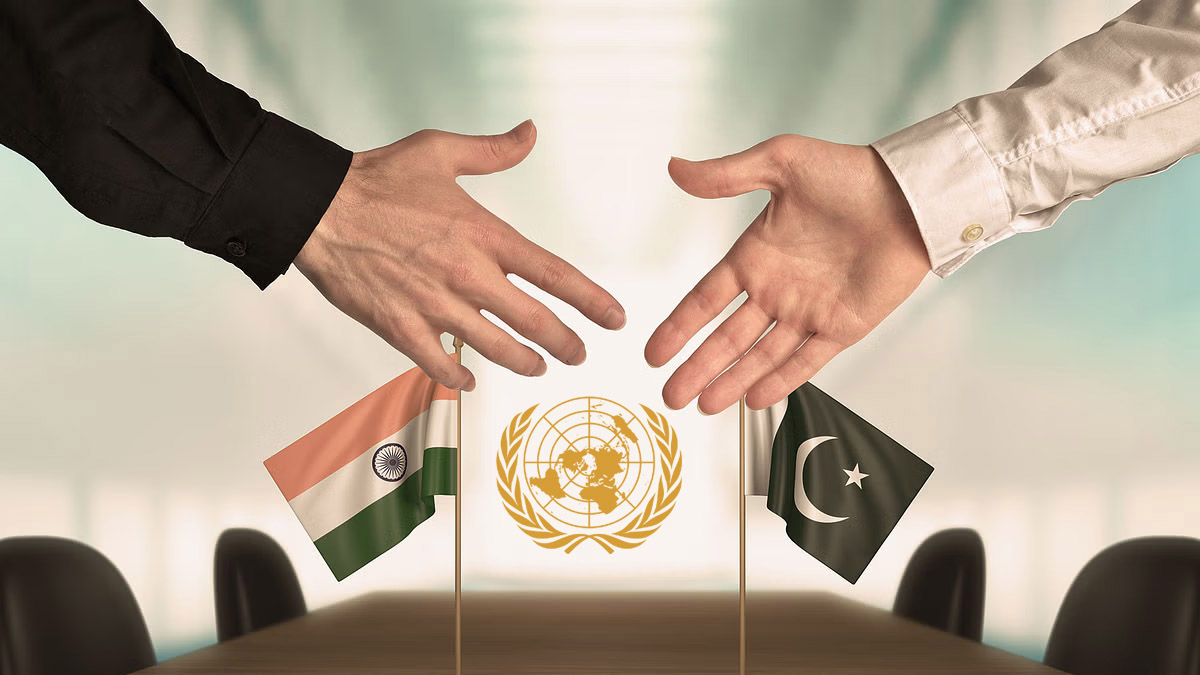
In a significant and controversial announcement, Pakistan’s government declared the Simla Agreement of 1972 as “dead,” signaling a drastic shift in its approach towards the Kashmir dispute with India. This bold proclamation was accompanied by Pakistan’s assertion that Kashmir can no longer be treated as a bilateral issue. Instead, Islamabad now seeks to redefine the Line of Control (LOC) as a mere ceasefire line, setting the stage for heightened tensions in the already volatile region.
The statement, issued during a high-profile press conference, sent shockwaves across South Asia and beyond. The implications of this new stance have far-reaching consequences for regional stability, diplomacy, and international relations. Here’s a detailed exploration of what this announcement means for the India-Pakistan relationship and the larger geopolitical landscape.
The Simla Pact: An Overview
The Simla Agreement, signed in July 1972 by Indian Prime Minister Indira Gandhi and Pakistan’s then-President Zulfikar Ali Bhutto, has been a cornerstone of India-Pakistan relations for over five decades. The pact was crafted in the aftermath of the 1971 Indo-Pak war, which led to the creation of Bangladesh. Its primary objectives were to establish a framework for peaceful resolution of disputes and to uphold the sanctity of the Line of Control (LOC) in Jammu and Kashmir.
The agreement emphasized bilateral negotiations as the means to address conflicts, explicitly excluding third-party mediation. This principle of bilateralism was seen as a step towards fostering trust and reducing hostilities between the two nations. However, the recent declaration by Pakistan that the Simla Pact is obsolete disrupts this long-standing diplomatic understanding.
Why Pakistan Views the Simla Pact as “Dead”
Pakistan’s government has provided several justifications for its new stance on the Simla Agreement. Officials argue that the agreement has lost relevance in the face of changing ground realities in Kashmir and the broader geopolitical context. They allege that India’s decision to abrogate Article 370 in August 2019, which granted special status to Jammu and Kashmir, was a unilateral move that violated the spirit of the Simla Agreement.
Furthermore, Pakistan’s leadership asserts that India’s reluctance to engage in meaningful dialogue on Kashmir has rendered the bilateral framework ineffective. They claim that the international community’s increasing focus on human rights violations in Kashmir necessitates a multilateral approach, bypassing the bilateral constraints of the Simla Pact.
Pakistan’s Foreign Minister also highlighted the ongoing ceasefire violations and militarization along the LOC as evidence of the agreement’s irrelevance. “The LOC is now merely a ceasefire line, not a boundary that represents a resolution,” he stated, calling for a renewed approach to the Kashmir conflict.
India’s Response: Reiterating Commitment to Bilateralism
India’s Ministry of External Affairs responded firmly, rejecting Pakistan’s characterization of the Simla Agreement. Indian officials emphasized that the agreement remains a valid and binding framework for managing bilateral relations. “The Simla Agreement has been a cornerstone of peace and stability in the region. Any unilateral declaration of its irrelevance is baseless and unacceptable,” an official statement read.
India also accused Pakistan of attempting to internationalize the Kashmir issue, contrary to the bilateral principles enshrined in the Simla Pact. New Delhi reaffirmed its position that Kashmir is an integral part of India and reiterated its commitment to resolving disputes through peaceful, bilateral dialogue.
Implications for Regional Stability
The declaration by Pakistan has significant implications for the already fragile stability of South Asia. By disavowing the Simla Agreement, Pakistan has opened the door to a more confrontational approach to the Kashmir issue. This shift could lead to increased militarization along the LOC, heightening the risk of skirmishes and further escalating tensions.
The move also complicates the diplomatic landscape, potentially inviting intervention from international actors. While Pakistan has long sought to bring global attention to the Kashmir dispute, India has resisted external involvement, adhering to the bilateralism outlined in the Simla Pact. This divergence in approaches could lead to renewed geopolitical rivalries, with countries like China and the United States playing a more prominent role in the region.
Historical Context and Future Prospects
The Simla Agreement has survived numerous challenges since its inception, including the Kargil conflict in 1999, the Mumbai attacks in 2008, and the Balakot airstrikes in 2019. Each of these events tested the resilience of the bilateral framework, yet the pact endured as a symbol of hope for peaceful coexistence.
However, Pakistan’s recent declaration marks a significant departure from this tradition. It reflects a growing sense of frustration within Islamabad over the lack of progress in resolving the Kashmir issue. The question now is whether this new stance will lead to meaningful change or further entrench the status quo.
Analysts are divided on the potential outcomes. Some believe that Pakistan’s move could pressure India into engaging in dialogue, while others fear it may backfire, leading to greater isolation for Pakistan on the global stage. The role of international organizations, such as the United Nations, will be crucial in shaping the trajectory of this dispute.
The Role of International Actors
The international community has been a silent observer of the India-Pakistan conflict for decades. However, Pakistan’s declaration could galvanize global actors to take a more active role in mediating or facilitating dialogue. The United Nations, in particular, may find itself under increased pressure to address the Kashmir issue, especially given the human rights concerns raised by Pakistan.
On the other hand, India’s strong opposition to third-party mediation complicates the equation. New Delhi’s emphasis on bilateralism and its strategic partnerships with major powers like the United States and Russia may limit the scope for international intervention. Nonetheless, the evolving dynamics of the Kashmir dispute will undoubtedly draw global attention in the coming months.
Domestic Reactions in Pakistan

The declaration has sparked mixed reactions within Pakistan. Some factions have hailed the move as a bold step towards asserting Pakistan’s stance on Kashmir. Proponents argue that the Simla Agreement has long been used by India to stall meaningful dialogue and that its dismissal paves the way for a more assertive strategy.
Conversely, critics within Pakistan have raised concerns about the potential fallout. They fear that abandoning the bilateral framework could isolate Pakistan diplomatically and escalate tensions with India, potentially leading to economic and security repercussions. Voices from the business community, civil society, and academia have called for a more nuanced approach to addressing the Kashmir issue.
Economic Implications of Heightened Tensions
Heightened tensions between India and Pakistan inevitably have economic repercussions. Cross-border trade, already limited, could face further restrictions, impacting the livelihoods of thousands. The uncertainty surrounding the Kashmir issue also deters foreign investment in the region, hindering economic development.
For Pakistan, increased defense expenditure to manage heightened tensions along the LOC could strain its already fragile economy. India, while better positioned economically, would also face the economic burden of maintaining heightened military readiness. Both nations stand to benefit from peaceful resolution and economic cooperation, underscoring the need for dialogue despite current hostilities.
Media Narratives and Public Perception
The media plays a crucial role in shaping public perception of the Simla Agreement’s dismissal. In Pakistan, state-backed media outlets have largely portrayed the declaration as a necessary and strategic move. Stories highlighting alleged human rights violations in Kashmir have been amplified, aimed at garnering international sympathy and support.
In India, the narrative focuses on reaffirming the country’s sovereignty over Kashmir and emphasizing the resilience of its diplomatic framework. Media outlets have criticized Pakistan’s move as an attempt to divert attention from its internal challenges, including economic instability and political unrest.
Social media platforms have become battlegrounds for competing narratives, with hashtags and campaigns reflecting the polarized views of citizens on both sides of the border.
Path Forward: Dialogue or Deadlock?
The declaration that the Simla Pact is “dead” represents a turning point in the long and tumultuous history of India-Pakistan relations. While the immediate consequences are likely to be increased tensions and diplomatic posturing, the long-term implications remain uncertain.
Both nations face the challenge of navigating this new phase with caution and responsibility. For India, maintaining its territorial integrity and national security will remain paramount. For Pakistan, achieving international support and legitimacy for its position on Kashmir will be a top priority.
As the region braces for the fallout of this dramatic announcement, the need for dialogue and diplomacy has never been greater. The world will be watching closely as India and Pakistan chart their course in this new era of their relationship.

